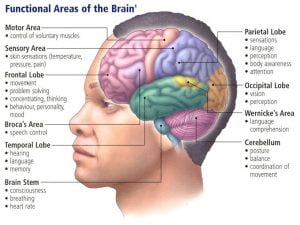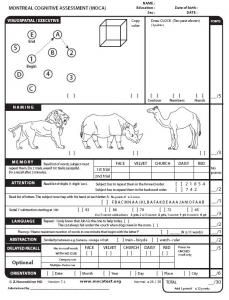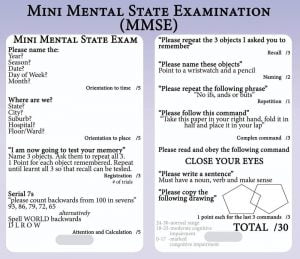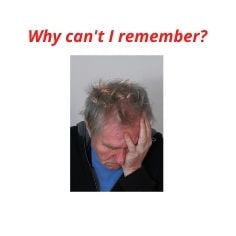Loss of Memory Part 2
What are the Investigations in Memory loss and how to get it done

Introduction-
Dementia or Alzheimer’s disease is very common in people who live in stressful situations and those who are well above their 60s.
Learn the signs and symptoms of dementia and Alzheimer’s disease to determine if you are going in for either of these conditions.
Welcome back to Part 2 of the series on Loss of Memory. In my last article[Click here in case you have not read it], we discussed the brain’s different parts and their function. Taking off from there, we proceed ahead to learn about the causes and the investigations of Memory Loss.
What are the common causes of Loss of Memory?

Before we take up the investigations, let’s see what the common and uncommon causes of loss of memory are-
- Old Age-very common. As with other organs of the body, our brain also changes from aging. The brain is known to shrink in size.
- High blood pressure- hypertension (read here to know how)
- Head Injury-Most of the head injuries, either due to a fall on the head or due to some vehicular accident, can lead to brain compression due to blood accumulation in a particular area of the brain. In this case, there is a temporary loss of memory. [I will explain this with an example below]
- Infections of the brain like Encephalitis.
- Drinking Excessive Alcohol – According to research, excessive alcohol causes brain damage, termed Alcohol-Related Brain Damage{ABRD}. Alcohol🍸 affects the area of the brain 🧠 called the Wernicke’s area, where there are nerve cells that help in the comprehension of speech.
–A person with ARBD may experience all of these types of damage. The
different types of damage are linked to different types of ARBD. For
example, Wernicke–Korsakoff syndrome is most closely linked with low
levels of thiamine [vitamin B1]-Source- Alzeimhers.org.uk - The lack of or absence of blood supply to the part marked Broca’s area and Temporal lobe of the brain.

This mostly causes a condition called stroke resulting in loss of memory and paralysis of some body parts. Sometimes there is a minor cut-off of blood supply leading to temporary memory loss. This is termed Silent Stroke, wherein the patient may complain of weakness of some parts of the body like one hand or leg. He or she may not be able to recall what he/she said a few moments ago.
What’s the difference between Memory loss due to Dementia and a Silent Stroke?
In this article, I will discuss everything about Dementia, which usually occurs as we age.
Read on-
Memory loss due to Dementia/Alzheimer’s disease-
You must have noticed the changes occurring in our body as we age, namely-
- The appearance of wrinkles on the face.
- Greying hair.
- Shortening of our height-due to loss of calcium from the vertebral bones.
- Changes in our vision- due to cataract of the lens of our eyes, thinning of the retina.
- Slowing down of our ability to walk, etc., etc.
As with other parts of the body, the all-important learning center and the center for recollecting and memory-The Brain- also ages accordingly. The ability to grasp what is being said, understand what is being said, and recollect most of the things that have been said also declines. This is the condition which we call Dementia-leading to Memory loss.
What happens in our brain that leads to Dementia?
Our brain is something like a modern computer where data is stored in a place called the Hard-Disk. Similarly, there are parts in the brain, such as the hippocampus, which is the seat of our memory.
Like the computer, which has a memory chip present in the hard-disk and is connected to different parts of the computer by parts called software, our brain has millions of nerve cells called neurons. These are connected by extensions called dendrites.
The dendrites are connected by ends called synapses. These synapses can get disrupted, causing malfunction of brain activity due to to-.
- Lack of oxygen
- Reduced supply of energy-giving glucose
- Some infection in the brain
A Case Study
These conditions mentioned above are the more common ones you come across day-to-day. But there are some conditions like sudden grief[read here] or a head injury that can also lead to temporary memory loss. Like, for instance, this patient who I came across while I was in the second year of my MBBS course-
A 45-year-old male patient was brought to the General Hospital, Solapur, in an unconscious condition. He was badly beaten up with severe injuries to his head. He was being treated by the Civil Surgeon, Dr.Hoshang, at that time.
Dr.Hoshang explained to our group of students, as part of the surgical posting, all the intricacies of head injury that had led this person to this present condition- he was in Coma. The reason for him being in a coma[a state of deep unconsciousness] was a large clot of blood that had formed due to internal bleeding. It was compressing the cortex of the brain.
Dr. Hoshang removed the clot surgically and slowly, over the days, the brain expanded to its normal size. The patient started recovering and was soon out of the coma and regained consciousness. But, as a side effect of the brain’s compression, he had lost his memory and was unable to remember anything. He could not recollect –
- His name;
- Where was he from;
- What happened to him that landed him in the hospital.
Over a period of two weeks, he regained his memory completely and was able to recollect everything. This condition is called Temporary Amnesia.
What is Alzheimer’s disease?
Alzheimer’s disease is one type of dementia and also the most common one to occur. In this type of dementia, there is a loss of memory causing-
- Difficulty in retaining recent information. For example, if he has been told to repeat, say the names of a few people he may know, he may not do so.
- Inability to recall recent events like conversations, songs which he has just heard, etc.
- Trouble in tracking upcoming events like attending an invitation to a party, marriage, etc.
- To make repetitive comments ( like the case mentioned above)
Are there any tests or investigations to detect Memory Loss?
Yes, there are two tests, namely-
A] The Montreal Cognitive Assessment (MoCA)-
This test is to be carried out by a person trained in this test, such as Neuro physicians or Neuropsychiatrists. The figure shown below is an example of how this test is done.

Here the patient’s mental status is evaluated by making them answer a set of questionnaires presented to them as shown above. The level of dementia or memory loss is then calculated as per the points shown on the right-hand side. There is a set of 30 questions that the patient is made to answer.
- A score of 26 and above is considered Normal.
- A score of 21 to 26 goes in favor of mild memory loss.
- A score between 16 to 20 confirms Alzheimer’s disease.
B] The Mini-Mental State Examination test-
This a similar test to MoCA. It is also carried out to judge the mental status of a person suspected of memory loss. This is how it looks like-

You can Download both these tests and evaluate if you are going in for dementia or memory loss. That way, we can take further steps to prevent it[more in Part 3 of this series]
Are there any blood tests /any other tests to detect impending Dementia or Alzheimer’s disease?
Research shows that there are certain proteins responsible for changes in the way we remember and forget. These proteins are-
- The tau proteins-p-tau217
- Amyloid proteins
These proteins can be detected in the blood by using tests known as Bio-markers – namely-
- Certain proteins called Amyloid-beta peptides floating in the blood
- A fat-binding protein called apolipoprotein E.
The levels of these protein components are high in the blood in patients with dementia or those going in for Memory Loss. You can get these tests done here in India.
Another way to find is by doing a brain scan called the PET scan. This scan shows the p-tau and amyloid plaques formed tangles in the brain, causing the cells to store the memory to die. For PET scan in India, Click Here.
Watch the video at the end of this article to know how exactly this happens.
What happens in Dementia or Alzheimer’s causing Loss of Memory? The high levels of these proteins in the brain cause plaques and tangles in the brain’s nerve tissues. Watch this very short video- a GIF- showing the involvement of the above-mentioned proteins in causing changes or disruptions in the nerve tissues in the brain leading to the tangles and plaques –
Here is another video that will explain to you in detail exactly how these proteins affect our brain leading to loss of memory- link
I have covered almost all the essential tests to rule out memory loss/dementia/Alzheimer’s disease. Before we leave, kindly listen to this podcast on investigations in Memory loss.
We stop here today. But before we go, did you know that the food we eat influences our brain 🧠 health? Here is a very good article that I came across that tells us how eating highly nutritive food cannot only help us keep our general health in good shape as well as our brain health- Procerahealth.com
For those who wish to learn more, especially family physicians,here is a learning material for detecting Alzheimer’s disease- Click the link below-
Screening for Early Stages of Alzheimer’s Disease in Primary Care
Sent using the Medscape App for Android™
In my next blog, which will be published shortly, we will discuss the prevention and treatment of memory loss/dementia/Alzheimer’s disease.
Those with dementia are still people and they still have stories and they still have character and they're all individuals and they're all unique. And they just need to be interacted with on a human level. Carey Mulligan Share on X
